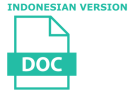Aktualisasi Diri Calon Guru Bahasa Inggris Dalam 21st Century Learning
Agnes Siwi Purwaningtyas(1*)
(1) Universitas Gadjah Mada
(*) Corresponding Author
Abstract
Language teaching in the 21st century should accommodate various skills that must be acquired by the students which include skills to analyze and solve problems, create and innovate, think critically, collaborate, and communicate. Language teachers should also integrate information and communication technology in the learning process to improve the quality of learning instruction and help to reach those learning goals. Addressing these challenges, teachers as well as teacher candidates need to develop their qualities and keep updating their knowledge. Teaching training program in the university therefore offer courses and programs to improve the competence and skills of the teacher candidates. English Program of Vocational College of Universitas Gadjah Mada also offer similar training although it is not extensively implemented since it only covers the introductory foundation for language teaching. Nevertheless, the students successfully demonstrate their teaching potentials and self-actualize themselves as teachers. The results of questionnaire, observation, and reflection show that the teacher candidates actualize their potentials as decision maker, designer, manager, learning facilitator, motivator, as well as creative, reflective, technology-literate, self-efficacious, and communicative teacher.
Keywords
Full Text:
PDFReferences
Blair, N. (2012). Technology for 21st century learner. Diakses 15 Maret 2017, dari https://www.naesp.org/sites/default/files/Blair_JF12.pdf
Boon, A. (2011). The reflective teacher: Towards self-actualization. The Language Teacher 35(4) hal. 27-29
Brown, D. (2000). Teaching by Principles (2nd Ed.). New York: Longman
Grant, C.A. & Zeichner, K.M. (1989). On Becoming a Reflective Teacher. New York: Allyn and Bacon
Goodwyn, A. & Branson, J. (2005). Teaching English. New York: Routledge
Maslow, A.H. (1971). The Farther Reaches of Human Nature. Arkana: Penguin Books
Organization for Economic Co-operation and Development. (2006). 21st Century Learning Environments. OECD Publishing
Partnerships for 21st Century Learning. (2016). Framework for 21st century learning. Diakses 10 April 2017, dari www.P21.org
Protheroe, N. (2008). Teacher efficacy: What is it and does it matter?. Principal. Diakses 10 April 2017 dari https://www.naesp.org/.../1/.../Teacher_Efficacy _What_is_it_and_Does_it_Matter.pdf
Rich, E. (2011). How do You Define 21st Century Learning? Diakses 10 Februari 2017 dari http://www.edweek.org/tsb/articles/2010/10/12/01panel.h04.html
Richards, J.C. & Farrel, T.S.C. (2005). Professional Development for Language Teachers: Strategies for Teacher Learning. New York: Cambridge University Press
Richards, J.C. & Lockhart, C. (2007). Reflective Teaching in Second Language Classrooms (15th ed). New York: Cambridge University Press
Slavin, R. (2005). Educational Psychology: Theory and Practice (8th Ed.). Pearson Education
Steven, M. (2011). 21st Century Learner. National Education Association. Diakses 10 Februari 2017 dari http://www.nea.org/home/46989.htm
Stronge, J.H. (2007). Qualities of Effective Teacher. Alexandria: ASCD.
Trilling, B. & Fadel, C. (2009). 21st Century Skills. San Fransisco: Wiley
UNESCO. (2006). Teachers and Educational Quality: Monitoring Global Needs for 2015. Montreal: UNESCO
Article Metrics
Refbacks
- There are currently no refbacks.
Copyright (c) 2017 The Author(s)

This work is licensed under a Creative Commons Attribution-ShareAlike 4.0 International License.







